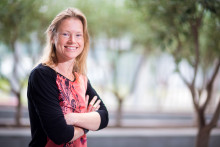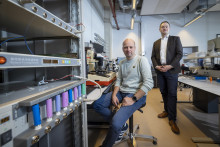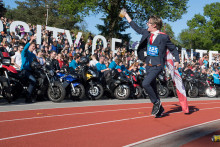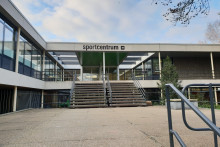vici
Vici is one of the largest scientific grants for individuals in the Netherlands and targets senior researchers. Kerensa Broersen was the only UT scientist to receive a Vici in the previous three years. The UT missed out on the grant in 2020 and 2021. A success rate of receiving a Vici is about 13%. Out of 266 applications, a total of 34 Vici grants were awarded this year.
Christian Nijhuis is professor at Hybrid Materials for Opto-Electronics (Faculty of Science and Technology). He has received the grant for his research into ‘Intelligent Molecules for Brain-Like Devices’. This research aims to develop novel technology inspired by the human brain. The scientist is working on intelligent molecules that can mimic the computational methods of human brains and to explore how they can be applied to develop energy-efficient computers.

Professor Christian Nijhuis. Photo by Hans Wolkers.
Professor Floris Zwanenburg works at UT’s MESA+ Institute for Nanotechnology and chairs an independent research line on quantum electronics within the NanoElectronics group (Faculty of Electrical Engineering, Mathematics and Computer Science). He will use the Vici for researching ‘Single-atom quantum coherence’. Main goal of the project is to fabricate electronic circuits with a single atom in the heart of the device, which are ideal to investigate atomic properties. In the long run these single-atom circuits can be used as the building block of a quantum computer.

Professor Floris Zwanenburg. Photo by Arjen Reef
Mark Huijben, professor of Nanomaterials for Energy Conversion and Storage (Faculty of Science and Technology), has been awarded the Vici for his project ‘Superior microbatteries by tailoring interfaces for an interconnected society’. Its goal is to improve the performance of microbatteries for future wireless and autonomous applications of advanced microelectronic devices. The scientists will circumvent the limitations in conventional microbatteries by creating crystalline, highly ordered architectures. Their solution could lead to superior energy storage in next generation microbatteries.

Professor Mark Huijben. Photo by Rikkert Harink







